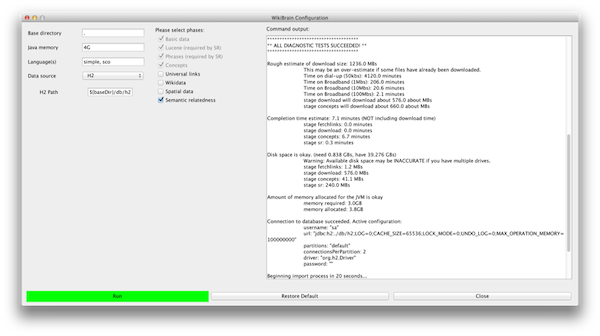Importing data
The Graphical Loader offers the easiest way to import data. However, WikiBrain supports much more sophisticated importing configurations.
GraphicalLoader
You can launch the graphical loader by double-clicking the wikibrain-withdeps jarfile, or by running the org.wikibrain.GuiLoader class.
After running the class, you’ll see the loader program:

You can customize basic features of the loading process using the graphical loader.
Be aware that the loader writes a configuration file named customized.conf that you’ll need to use when running your java programs (i.e. -c customized.conf).
Customized loading setups
You can achieve more customized loader setups by running the Loader program directly. You can do this your IDE’s run dialog, or by downloading and installing the wb-java.sh script described in the Installation page.
WikiBrain’s Loader class manages the downloading, parsing, and import of Wikipedia datasets published by the Wikimedia foundation.
Most commonly, Loader is run without any arguments except a language. This downloads, parses and imports the latest database files for the Simple English langauge edition of Wikipedia into an embedded h2 database:
org.wikibrain.Loader -l simple
Each step in the WikiBrain loading process is called a stage.
By default a set of core stages are loaded (articles, links, lucene search index), but others are not (wikidata, spatial).
You can specify the stages you want loaded, such as wikidata using the -s option:
org.wikibrain.Loader -l simple -s wikidata
You may also want to configure how the stages you select are run. For example, you can specify that each stage should incorporate a custom override configuration file:
org.wikibrain.Loader -l simple -s wikidata -c custom.conf
These features are explained in more detail below.
Stage selection
WikiBrain’s import pipeline is divided into stages, listed in the table below.
If you don’t tell WikiBrain to load specific stages, the stages marked on = Y are run.
The concepts stage is also run by default if more than one language is installed.
| on | stage | dependsOn | description |
|---|---|---|---|
| Y | fetchlinks | nothing | Downloads a list of available data files in the requested languages. |
| Y | download | fetchlinks | Downloads any new data files in the requested languages. |
| Y | dumploader | download | Loads articles and raw pages from the dump files. |
| Y | redirects | dumploader | Loads redirect mapping. |
| Y | wikitext | redirects | Loads links and categories. |
| Y | lucene | wikitext | Builds lucene full-text search indexes. |
| Y | phrases | wikitext | Builds and loads phrase to page disambiguation mappings. |
| ? | concepts | redirects | Builds and loads mapping from language-specific articles to universal concepts. |
| N | universal | concepts, wikitext | Builds “universal” links. |
| N | wikidata | concepts | Downloads and loads wikidata facts for the requested languages. |
| N | spatial | wikidata | Installs geospatial data. |
| N | sr | wikitext, phrases, lucene | Builds semantic relatedness models. |
You can run a specific stage using the -s flag.
For example, the following command builds the semantic relatedness (SR) model and prepares it for use.
org.wikibrain.Loader -s sr
You can specify multiple stages using multiple -s arguments:
org.wikibrain.Loader -s sr -s spatial
If you ask WikiBrain to run a stage (e.g. sr), it checks to see if the stages it depends on (in this case, wikitext, phrases, lucene) have been run.
If necessary it runs them, and any further transitive dependencies.
You can disable checking to see if a stage is run, and rerun all necessary stages by using the -d dependency (for drop).
Configuring stages
You can configure the global settings for all stages by passing any “standard” WikiBrain argument. If any of these options exist, they will be passed along to all stages.
-c,--conf configuration file
-h,--threads the maximum number of threads that should be
used
-l,--languages the set of languages to process, separated by
commas or 'LOADED'
--base-dir the base directory used to resolve relative
directories
--tmp-dir the temporary directory
In addition, you can pass stage-specific arguments via the -s flag.
For example the following command runs the phrase stage (turns it on), and passes the argument -p stanford to it to tell it to load the Stanford concept analyzer.
org.wikibrain.Loader -s "phrases:on:-p stanford"
More details
Each WikiBrain stage corresponds to a Java class with a main() method that can be run as a standalone Java program.
For example, the wikitext stages coresponds to org.wikibrain.loader.WikiTextLoader.
You can find the full definition of stages at the end of the reference.conf.